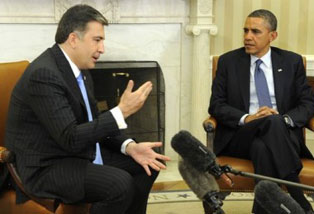The Washington Post, By Editorial Board
GEORGIAN PRESIDENT Mikheil Saakashvili indignantly protests there is no comparison to be drawn between him and his nemesis, Russian Prime Minister Vladi¬mir Putin. In a meeting with The Post’s editorial board last week, he ticked off the differences: Mr. Putin’s regime is founded on corruption, while his is known for cleaning up Georgia’s once-dirty police and bureaucrats. Mr. Putin wages war on minorities, while Mr. Saakashvili’s government just passed a law to protect religious pluralism. Mr. Putin frequently opposes U.S. foreign policy, while Georgia has been a strong ally; it is about to double its troop contingent in Afghanistan.
So why is the Georgian leader getting lumped into the same sentence as the Russian strongman? With elections for parliament and president due in 2012 and 2013 and facing a term limit, Mr. Saakashvili has refused to rule out repeating a maneuver patented by Mr. Putin. Having supported a reform last year that weakened the presidency in favor of the prime minister, Mr. Saakashvili has left open the possibility of switching between the two jobs — just as Mr. Putin did in 2008. “I don’t want to be a lame duck,” he told us.
Georgia’s constitutional reform was justified, apart from any personal ambition by Mr. Saakashvili. Its elections, though flawed, have been freer and fairer than Russia’s. In fact, Georgia’s role as a pioneer of liberal economic and political reform in the former Soviet Union is the principal reason for the bipartisan support it has enjoyed in Washington and for its place as the leading candidate in the Caucasus for eventual membership in NATO and the European Union.
But that is precisely the point: If the coming elections produce a government still dominated by Mr. Saakashvili, who has been Georgia’s leader since the “Rose Revolution” of 2003, its supporters in the United States and other Western countries are likely to conclude that it isn’t so exceptional, after all. Its institutions, such as the courts, remain fragile. The media’s independence is shaky. Mr. Saakashvili’s party is likely to dominate the coming parliamentary vote. If Georgian democracy is to grow stronger, Mr. Saakashvili will have to respect the intent of the constitutional term limit and give way to other leaders.
President Obama, who has held Mr. Saakashvili at arm’s length through most of the past three years, welcomed him to the White House last week. This was, in part, a reward for Georgia’s cooperation in allowing Russia into the World Trade Organization, despite Russia’s continuing occupation of Georgian territory; it was also an inoculation for Mr. Obama against Republican claims that Mr. Saakashvili is one of the U.S. allies he has “thrown under the bus.” For his part Mr. Saakashvili proclaimed himself delighted with the results of the meeting, in which Mr. Obama promised enhanced defense cooperation and consideration of a free-trade treaty.
But we trust the Georgian president also heard Mr. Obama say that he was “anticipating fair and free elections” and “the formal transfer of power that will be taking place in Georgia.” If Washington concludes following the parliamentary and presidential elections that those conditions have not been met, Georgia will have a big problem — regardless of whether Mr. Obama wins his own election.




